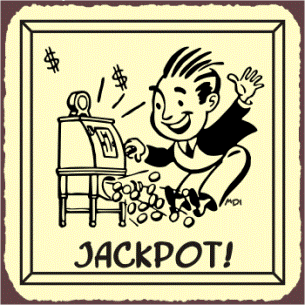When a progressive jackpot slot machine or other game reaches repletion, is it really “overdue” for a strike?
 Progressive gambling games are unique in the sense that they are capable of paying out incredible prizes far greater than any other. A standard slot machine might cap its payoff at $10,000, while a progressive jackpot slot may start at $10k, and grow continuously higher until someone wins it. The same comparison can be made of instant scratch-off lottery tickets with a predefined number of predetermined prize amounts, versus exponentially profitable number-draw lottery games.
Progressive gambling games are unique in the sense that they are capable of paying out incredible prizes far greater than any other. A standard slot machine might cap its payoff at $10,000, while a progressive jackpot slot may start at $10k, and grow continuously higher until someone wins it. The same comparison can be made of instant scratch-off lottery tickets with a predefined number of predetermined prize amounts, versus exponentially profitable number-draw lottery games.
It is that fantasy-size prize that draws so many players to enjoy these types of games. The larger the prize becomes, the more people there are willing to risk a few dollars on the long-shot odds of winning a life-altering prize. We all know the saying “someone has to win it” rings true, but what about this one?
Is a Progressive Jackpot Ever Overdue to Strike?
I’ve heard it suggested, more times than I care to estimate, that a big progressive must be overdue for a win. When the jackpot is low, it’s not likely to pay out, but when it rises to repletion, it’s bound to pay out soon. Is this true, or just another myth of the gambler’s fallacy?
To answer this question, let’s take a look at it from a statistical standpoint. Being the most popular internet gambling jackpot the world over, I’ll use Microgaming’s Mega Moolah progressive network as an example. If you didn’t know, there are websites specifically dedicated to tracking the Mega Moolah, recording and expounding upon its complete payout history – that’s how popular it is. Using this information, let’s take a closer look…
According to these statistics, in the last ten years, the Mega Moolah has paid out its guaranteed 7-figure (or more) jackpot 61 times. By these numbers, we can calculated the average strike to be once every 8 weeks and 3 days (57 days). So, if the jackpot hasn’t paid out in the last 9 or 10 weeks, do we assume for a hit?
What about the size of those jackpots. The average payout in all these years is said to be $5,730,619. If the jackpot rises above, say, $6 million, does that mean its risen to repletion? Is it brimming with payout potential because it’s hit an above-average mark?
Some might answer yes to both of these questions, but I beg to differ. Those who claim it does are either lottery and/or casino promoters hoping to encourage more bets, or people who were convinced by the latter to bet more.
If we continue to dig deeper into the statistical data, there’s much more evidence that “overdue” jackpots don’t exist. Yes, the average Mega Moolah payout is $5.73 million, but the highest payout on record is over €18.9 million ($21 million). Many more Mega Moolah jackpots have climbed to similar heights over the years. On the opposite end of that spectrum, the lowest payout was just $1,013,791; a mere $13.8k above its initial seed amount. That’s because the jackpot struck back-to-back in just two days time.
Not only are slots jackpots entirely unpredictable, they are never, ever “due” or “overdue” to pay out, unless they are one of the rare…
Progressive Slots With a Guaranteed Payout Rate
There are some online slot machines – not many, but they do exist – that come with a special guaranteed payout rate. The last one I saw was a small progressive, a penny slot game, that guaranteed it would release its jackpot before reaching $20,000. Now if you see a game like this with a jackpot nearing its guaranteed payout rate, by all means, play it! Otherwise, don’t get your hopes up, no matter how high the prize.





